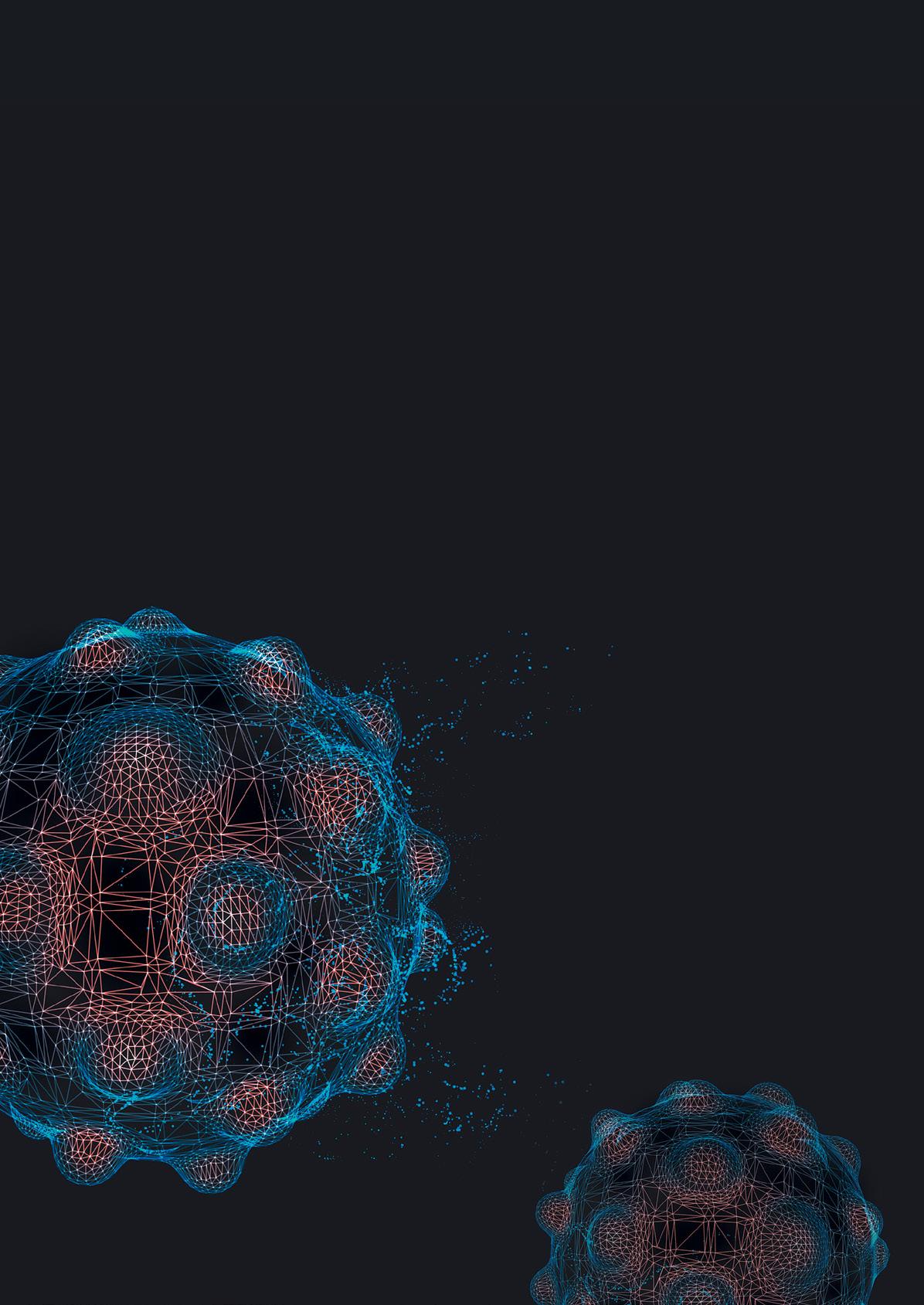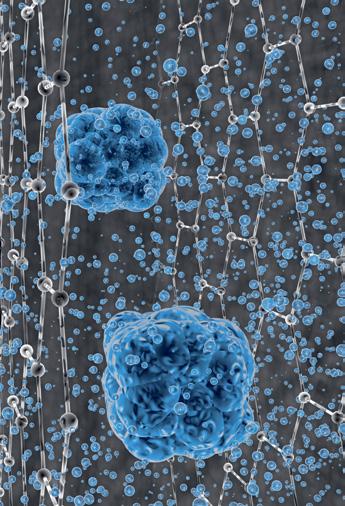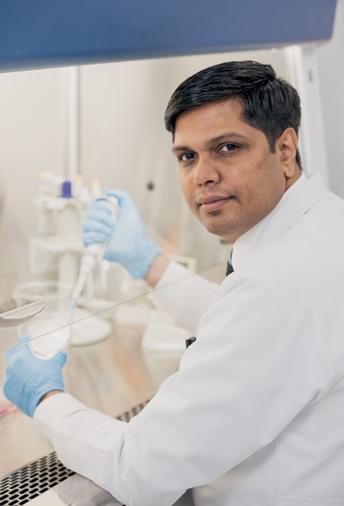
5 minute read
SHEDDING LIGHT ON MUTATION IN HYPOXIC CANCER CELLS
A research project investigating cancer cells that can grow and adapt with a limited oxygen supply is hoped to provide some insights into markers for better immunotherapy treatment.
Oxygen deprivation in a cancer cell occurs when a solid tumor grows quickly, which can cause the core of the cancer to become too distant from the blood vessels supplying it with oxygen. While a lack of oxygen, or hypoxia, can be detrimental to normal human cells, it can strengthen cancer cells’ resistance to treatments. However, scientists believe that the same hypoxia that impedes chemotherapy and radiation treatment in cancers can be used to identify mutated cells and develop targeted therapies to combat this devastating disease.
Advertisement
That is why Dr. Goutham Hassan Venkatesh, Assistant Professor and Research Scientist at the Thumbay Research Institute for Precision Medicine of Gulf Medical University in Ajman, is leading a research project exploring oxygen deprivation in breast cancer tumor cells. The research team hopes the project will increase scientific understanding of hypoxic tumors, as well as identify unique biomarkers that can be used to develop targeted cancer immunotherapy treatments.
Collaborators on the project include: Ms. Pamela Bravo, Mr. Philippe Dessen, Dr. Jerome Thiery, and Prof. Filippo Rosselli from the Gustave Roussy Cancer Centre and the Faculty of Medicine at University Paris-Saclay in Villejuif, France; Dr. Walid Shaaban Moustafa Elsayed from the College of Dentistry at Gulf Medical University in Ajman, UAE; Dr. Bartosz Wojtas from Nencki Institute of Experimental Biology post-doc; Mr. Hussam Hussein Nawafleh, Dr. Francis Amirtharaj, Dr. Raefa Abou Khoza, and Prof. Salem Chouaib from the Thumbay Research Institute for Precision Medicine at Gulf Medical University in Ajman, UAE; and Mr. Sandeep Mallya and Dr. Kapaettu Satyamoorthy from the Department of Cell and Molecular Biology in the Manipal School of Life Sciences at the Manipal Academy of Higher Education in Manipal, India.

A paper on their research was recently published in the peer-reviewed journal OncoImmunology. The project, which began in 2018, was funded by the Sheikh Hamdan Bin Rashid Al Maktoum Award for Medical Sciences.
Explaining the motivation behind this study, Dr. Venkatesh said: “We were interested to identify whether hypoxic tumors acquire mutations. If so, how does this happen? Do the mutations lead to an increase in the tumor mutational burden, which counts the total number of mutations in cancer cells? And do hypoxic cells express any antigens – which are the molecules or molecular structures expressed on the surface of a cell – that are suitable targets for immunotherapy? If we can identify such antigens, we can improve the efficacy of immunotherapy treatments.”

Immunotherapy is an emerging form of cancer treatment where specially designed medicines are used to encourage a patient’s immune system to fight off the cancer. This approach may prove to be more effective than standard treatments, such as chemotherapy and radiation, for hypoxic tumor cells. Chemotherapy is a systemic treatment that circulates medication through the blood stream seeking all rapidly growing cells in the body, which includes cancer as well as healthy structures such as hair follicles and the lining of the stomach. Radiation therapy is a localized treatment, which directs high-powered bursts of energy at specific cancer sites to kill the cancer cells. In chemotherapy, hypoxia induces cellular adaptations that compromise the drug’s effectiveness, while in radiation the primary treatment mechanism is the creation of reactive oxygen species, which hypoxic tumors resist.
Immunotherapy differs from these standard cancer treatments in that it uses specific medications to improve the body’s own ability to target and destroy the malignant cells.
According to the US-based Cancer Treatment Institute, immunotherapy has been proven effective against types of cancer that have historically been resistant to chemotherapy and radiation. Immunotherapy can also provide long-lasting benefits, improving the patient’s ability to fight off recurrent cancer. In contrast, the benefits of chemotherapy and radiation last only as long as the treatment does.
While immunotherapy is considered a promising emerging treatment for cancer, it is estimated that only 20% to 30% of cancer patients respond to the drugs that boost the immune system’s ability to target cancer cells.
“Several tumor-related factors contribute to the resistance to immunotherapy, including the presence of hypoxia in the tumor core. A hypoxic condition in the cancer core makes it difficult and inaccessible for immune cells to identify and kill the tumor cells,” Dr. Venkatesh noted.
One of the reasons for the poor immunotherapy response is the lack of defined biomarkers for cancer cell mutations, which are used to develop targeted immunotherapy.

Left to right: Dr. Walid Shaaban Moustafa Elsayed, Mr. Hussam Hussein Nawafleh, Dr. Goutham Hassan Venkatesh, and Dr. Raefa Abou Khoza
“Currently, the total number of mutations in the cancer cells, which is called the tumor mutational burden, or TMB, is used as a biomarker for predicting the immunotherapy treatment response, meaning it helps us know how well the treatment will work or not. We were interested to identify whether hypoxic tumors acquire such mutations, and if so, how does this happen? Do these mutations lead to an increase in TMB?”
To explore hypoxic tumors for mutations, the team analyzed breast cancer cells, looking specifically at their DNA damage and identifying the mutated antigens that are expressed on the surface of a tumor, called neoantigens. They found that hypoxic tumor cells express biomarkers that can be used in predicting immunotherapy’s effectiveness.
Highlighting the importance of his team’s findings, Dr. Venkatesh said, “From our research, we identified that hypoxia, despite being a factor for treatment resistance, contributes to the expression of biomarkers in the form of total mutations and neoantigens. It is our hope that our research findings will improve prospective preclinical and clinical studies into hypoxia, mutations, and neoantigen levels to achieve better immunotherapy outcomes.”
The next step for this area of research is to develop therapeutic strategies that target hypoxic cells in combination with immunotherapy to overcome the immunotherapy resistance of hypoxic tumor cells.
“This research offers multiple avenues for treatment, as these neoantigens derived from mutated proteins are ideal targets for cancer immunotherapy. As these antigens are produced in a hostile hypoxic environment, improving the immune system’s ability to recognize and attack the cancer cells is a challenge that needs to be addressed in future,” Dr. Venkatesh concluded.









